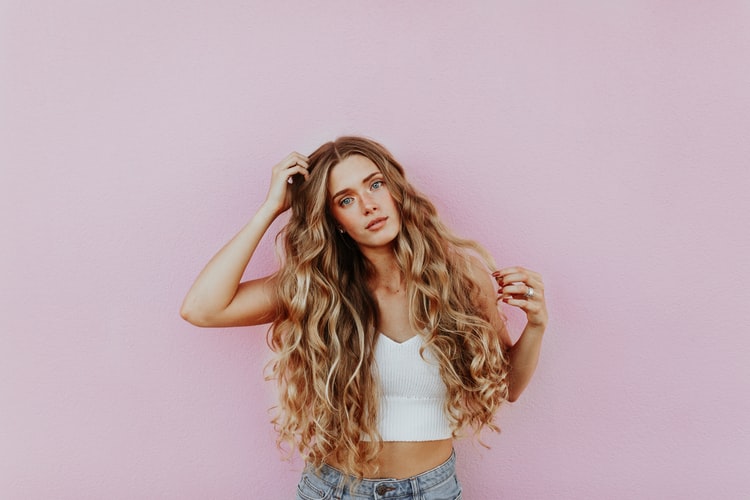
01 Feb Suffering from dry hair symptoms? We’ve got the ultimate dry hair treatment routine!
Dry hair. Most of us have a decent hair conditioner in our routines to prevent it, but the truth is, the majority of people will experience it at least once in their lives, and many of us don’t even know we’re suffering from it!
Whether you’ve taken steps to prevent it or you’ve never given it a moment’s thought, hearing your hair stylist utter the words ‘your hair is dry’ simultaneously sends shivers of horror down your spine and panic at the thought of how to treat it.
Luckily, there is a lot you can do to bring your dry hair back to life. A targeted routine and some top-quality dry hair treatments can bring straw-like hair back to life and ensure that silky-softness sticks around for good.
We’ve got the ultimate dry hair treatment routine for you, covering everything from the best shampoo for dry hair to how to care for dry hair after washing, so keep reading and get ready to kiss those dry hair symptoms goodbye!
What dry hair symptoms should you look out for?
If your dry hair diagnosis came as a surprise, you might be wondering how on earth you missed the telltale signs. Prevention is always better than cure, so recognising when your ends are becoming parched is crucial in keeping them healthy and silky.
- Split ends
- Rough texture
- Dull and lacking shine
- Breakage
- Tangles
Why is my hair dry?
Usually, finding a reason for why your hair is dry is fairly easy. A few of the most obvious culprits that cause dry hair symptoms to arise are:
- Too much hair colouring
- Other chemical treatments, like perms
- Heat damage from hot styling tools
- Over-washing
- Using an overly harsh shampoo
- Not using the right products for your hair type
However, there are a few additional offenders that are less obvious:
- Hard water
Hard water is full of minerals and metals that can strip your hair of moisture, as well as preventing your products from working properly and leaving your hair with a nasty mineral build-up.
- Sun damage
Just like our skin, our hair also needs protection from the sun’s harmful rays. UVA and UVB rays can cause hair to lose moisture faster.
- Chlorine or salt water
Whether it’s the sea or a pool, if you’re a swimmer of any kind your hair may be dry. Overexposure to salt and chlorine can cause moisture loss in your hair.
- Health issues
If you’re experiencing health issues of any kind, this can play a part in your hair health, too.
Start at the source
Dry hair treatments are most successful when you can also remove the cause of the dryness; after all, you don’t want your hard work to go to waste!
Give your hair a break
Resting your hair is a great place to start. Give your hair a break from chemical treatments, dye and any heat styling for at least a month to let it recuperate; washing it less often during this time is also a fantastic way to let your scalp’s natural oils provide your strands with some moisture.
De-mineralise
If you suspect hard water is causing your hair dryness, invest in a shower filter to get rid of all those nasty minerals and metals. You can also try a hard water treatment or a swimmer’s shampoo to get rid of any mineral build-up that’s already in your hair.
Look after your health
You are what you eat – or at least your hair is. A balanced diet packed with healthy oils, fats and vitamins is necessary for maintaining the overall health of your hair, including its moisture levels.
If you suspect health issues are at play, always consult your doctor or a health professional first.
The best dry hair treatment routine
So, how do you actually treat your dry hair and restore it to its former glory?
A hair care routine specifically designed to add moisture to your hair is the way to go, and combined with a little T.L.C. and some much-needed rest, your hair will be soft and shiny in no time.
How often should you wash your hair?
Ah, the age-old question. The simple answer is that every person will have their own individual hair-washing requirements, so it could be anything from daily to weekly – it really depends on how much oil your scalp naturally produces!
Try stretching out the time between washes, and make use of grease-fighting tactics like dry shampoo or slicked-back bun and braid hairstyles. You might be surprised at how many days you can go before you actually need to wash your hair.
If you can’t bear the thought of giving up your daily shampoo, then choosing products geared towards dry hair treatment is all the more important. Wondering which shampoo is good for dry hair? Keep reading!
What is the best shampoo for dry hair?
When it comes to choosing the best shampoo for dry hair, there are a few key ingredients to watch out for:
- Coconut oil
- Argan oil
- Shea butter
- Vitamin E
Choose shampoos packed with oils and emollient ingredients like shea butter to add some much-needed moisture to your strands.
Likewise, make sure to avoid certain harsh, moisture-stripping ingredients like:
- Sulfates: in particular, sodium lauryl sulfate
- Deep-cleansing shampoos
- Shampoo with a high protein content
Sulfates can easily strip away too much natural oil, so look out for sulfate-free shampoos if your hair is very dry. Similarly, deep-cleansing ‘detox’ shampoos are designed to strip out any oil or product build-up, and can be too harsh on dry hair.
Protein is another culprit known to exacerbate dry hair symptoms. Although it’s an excellent ingredient for repairing and strengthening damaged hair, too much protein can dry out hair quickly.
What’s a good hair conditioner for dry hair?
Similar to shampoo, a conditioner for dry, damaged hair that’s packed with oils and emollients will work wonders for bringing it back to life. Choosing a conditioner from the same range as your shampoo will ensure each moisturising ingredient works to the best of its ability.
Allow your conditioner to sit on the ends of your hair before massaging through and rinsing – if you suffer from dry ends and oily roots, make sure to only apply to your ends!
Beauty Savers tip:
Once you’ve shampooed and rinsed your hair, squeeze out as much water as you can before applying conditioner. This prevents your conditioner from being diluted and will deliver the strongest hit of moisture to your strands.
Best dry hair treatments to add to your routine
The right shampoo and conditioner is a great place to start, but if you really want to get those locks back to their former glory, a dry hair treatment is just what you need.
Hair mask
A high-quality, hydrating hair mask should be your first port of call when it comes to adding moisture to dry hair. Hair masks are best used once a week as part of your routine.
Just like with your shampoo and conditioner, the best ingredients to look out for here are oils (coconut, argan, avocado and monoi are all winners), emollients like shea and cacao butter and hair-boosting B and E vitamins.
Added ingredients like ceramides, glycerin and hyaluronic acid will further up your hair’s moisture content, and add silky-smooth shine to boot.
When it comes to choosing the best hair mask to treat your dry hair, opt for a mask tailored specifically to your tresses’ needs. Dry hair treatments for coloured hair, damaged hair and blonde hair all have individual added benefits for your locks.
Heat protectant
If you do still choose to use hot tools in your dry hair care routine, adding a good quality heat protectant spray or cream will work wonders in protecting your ends from frying any further.
Make sure to opt for a salon-quality heat protectant that specifies protection up to 230 degrees Celsius or higher!
Leave in conditioner
If you want to add even more moisture, or you find your locks become frizzy after washing, a leave-in conditioner is the one for you.
Leave-in conditioners for dry hair range from sprays, to creams, to balms, so you’re bound to find one you love.
Go for a leave in conditioning spray to treat your dry hair if you prefer lightweight products. Look for a combination of conditioning ingredients and heat protectant to streamline the products in your routine!
For moderately dry hair, a leave in conditioner cream will provide more moisture and can be applied in a more targeted way: if you have severely dry ends but find your roots get greasy, concentrate the cream on the ends and run the remainder through mid-lengths.
If you hair is very dry and frizzy, look out for a thicker leave-in hair balm. These super-strength dry hair treatments will de-frizz, moisturise and protect all at once.
Hair oil
Severely dry hair may need a little extra quenching, and a hair oil is the perfect solution. The stars of the show – argan oil and coconut oil – are once again two of the very best dry hair treatments.
Choose a concentrated concoction of oil and smooth a few drops onto washed, towel-dried hair as a leave in treatment. For added moisture and protection, top with a little leave in conditioner or heat protectant.
Beauty Savers tip:
For severely dehydrated hair, apply a good quality hair oil to dry hair before washing. It’ll help pre-condition your strands and protect them from drying out whilst you shampoo.
Dry hair FAQ
Your dry hair treatment questions, answered.
Are there any supplements to help dry hair?
Vitamin E, biotin, collagen and vitamin C supplements can help boost hair. Don’t forget, it’s always best to ask your doctor before taking any new supplements!
Does a dry scalp lead to dry hair?
It does! Your scalp produces natural oils that hydrate and protect your hair strands. If you’re suffering from a dry scalp try adding in a scalp conditioner or a scalp massage with your hair oil once a week.
Can you bleach dry hair?
It’s not recommended. Although some colourants are ok to use on dry hair, bleaching is one of the most harsh colour services you can have done and will strip even the healthiest hair of some moisture. Bleaching severely dry hair could lead to breakage and damage.
Your dry hair treatment routine:
- Wash as infrequently as possible with a moisturising shampoo
- Condition each wash
- Apply a leave-in treatment or hair oil after washing
- Never skip heat protectant
- Add a weekly moisturising hair mask




No Comments